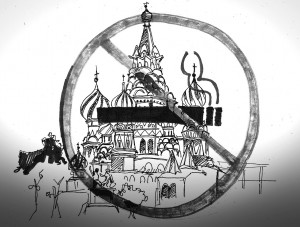Public smoking ban could worsen issue
Last Tuesday, Russia began a stand for health by partially passing one of the most stringent smoking bans in Europe, which would outlaw all smoking in public places. The proposal sailed through the State Duma — the lower house of Parliament — but will have to pass in the upper house and earn President Vladimir Putin’s signature before it becomes law. If enacted, there is no doubt that this legislation will be a challenge for a country of 43.9 million smokers — or 40 percent of its population, according to The Raw Story.
The ban is a big step in the right direction for the health of the nation and perhaps serves as a harbinger of a healthier world to come, but it also might not work because of its heavy-handed approach.
The fact that Russia, home to the largest tobacco market after China according to The Washington Post, is spreading its wings for health reform illustrates the heightened sense of public health urgency worldwide. Taking into consideration that 400,000 Russians die a year from smoking, the issue is no joke. The legislation is acting upon a legitimate issue in need of change, and its heart is in the right place. This is about protecting public health and carrying out civic responsibility.
The ban’s harshness, however, leaves the quesiton of its efficacy in the air.
If passed, the ban will go into effect June 1. According to BBC News, on that day, smoking will be prohibited within 15 meters of stations, airports, metro stations and ports. It will also be banned from workplaces, playgrounds, beaches and entrances to apartment blocks. On June 1, 2014, the policy will go one step further, banning smoking from long-distance trains, ships, hotels, restaurants, bars, cafes, shops, markets and subway platforms. A minimum retail price will be set for tobacco and advertising will restricted.
That leaves very few convenient places for citizens to smoke, essentially confining smokers to small areas that could be out of the way, and affecting tobacco prices for the worse. But to sidestep the problems this kind of heavy-handed legislation always brings, the ban must really embody a change of heart and mentality in the Russian people rather than force them to change too rapidly. For a country where one in three people are smokers, the jump might be a bit too drastic to swallow.
Rather, the ban needs to make way for a more realistic solution, allowing a little leeway to make sure the abrupt change will not spark an underground market that would counter and exacerbate the issue at hand. If banning takes place in such a short time, where do authorities expect the smokers will go? Will smokers simply cut back just because the law pushes them to?
With so many smokers in one country, the best policy might be to go slow on this change and ease it in first with designated zones for a longer time span than one year.
Aside from baby steps, this type of sweeping reform takes a change of culture, not just a change of policy. The difficulty of reducing smoking in Russia goes back to the desires of its people. Enforcement will be particularly difficult — police officers themselves often smoke in uniform in public, according to The Raw Story. Ultimately, the smoking ban is one way to spark this change in attitude, but ultimately, it’s the people themselves that will decide that it’s time to quit.
This issue digs deep into the bone, and the mentality of urgency and a full understanding of smoking’s dark side must come to light, not just in Russia, but in the world at large.
Not surprisingly, the United States is the largest tobacco market after China and Russia. Yet here, the fight is strong. Organizations, such as the American Cancer Society, the American Lung Association and California’s Clean Air Project, have taken strides to fight smoking and its harmful health effects, such as the Great American Smokeout, a day for smokers to convene, stop smoking for the day and resolve to quit. And the L.A. City Council in 2010 extended the city’s smoking ban to outdoor terraces.
But though the sentiment of the Russian policy is noble, the government needs to come up with a better plan, one that implements individual bans over time instead of all at once. Completely banning the act will only breed resentment in smokers instead of actually motivating people to quit.
Valerie Yu is a freshman majoring in biological sciences and English. Her column “Heart of the Matter” runs Fridays.

